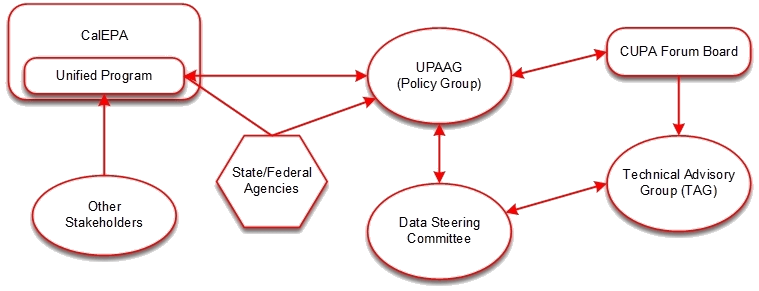The Unified Program protects Californians from hazardous waste and hazardous materials by ensuring consistency throughout the state in regard to administrative requirements, permits, inspections, and enforcement. CalEPA oversees the statewide implementation of the Unified Program and its 81 certified local government agencies, known as Certified Unified Program Agencies (CUPAs), which apply regulatory standards established by five different state agencies. Additional information regarding the Unified Program is available at: https://calepa.ca.gov/cupa.
The California Environmental Reporting System (CERS) is the statewide web-based system that supports the electronic exchange of required Unified Program information among businesses, local governments and the U.S. EPA. Assembly Bill 2286 (Feuer), effective January 1, 2009, requires all Unified Program regulated businesses and local regulating Unified Program Agencies (UPAs), to report and submit mandatory Unified Program information electronically, through CERS or a local UPA portal.
Unified Program information required to be submitted and reported electronically to CERS includes, but is not limited to facility data regarding hazardous material regulatory activities (such as, hazardous materials business plans, site maps, and chemical inventories), underground and aboveground storage tanks, hazardous waste generation, and inspection, compliance and enforcement actions. Additional information regarding CERS
electronic reporting requirements can be found at:
https://calepa.ca.gov/cupa/ereporting.
The flowchart below depicts the Unified Program governance structure, the means by which CalEPA receives input and communicates information relating to the Unified Program, including CERS and electronic reporting. The Unified Program Administration and Advisory Group (UPAAG) is co-chaired by CalEPA and the CUPA Forum Board and includes representatives from state agencies with Unified Program responsibilities and Unified Program Agencies (UPAs). The Data Steering Committee addresses technological and policy related issues. Technical Advisory Groups (TAGs) are established to resolve concerns and inconsistencies and provide clarification in the implementation of the Unified Program.
CUPA representatives to foster communication, training and issue resolution on specific Unified Program elements or areas of concern.

CERS Statistics
The CalEPA CERS technology team strives to maintain a high level of service availability. CERS is not guaranteed to be available on a 24x7x365 basis. CalEPA attempts to align Training and Staging environment service availability with Production service availability, but retains the rights to perform scheduled and unscheduled maintenance outside of these published availability timeframes for any of the portals. Regulators should alert CERS Technical Support if there is a critical/urgent event scheduled for the training, staging or other testing environment. CERS Technical Support:
cers@calepa.ca.gov, is available Monday through Friday, 8 a.m. to 5 p.m., except on designated
California State Holidays.
CERS should not be considered a guaranteed emergency response tool. Data needed for local emergency response should be stored locally to ensure access in the event of an emergency.
CERS hosted infrastructure leverages the California Department of Technology’s (CDT) CalCloud Infrastructure as a Service (IaaS) offering. CERS availability may be impacted during CalCloud maintenance.
The CalCloud Service Availability Plan outlines details related to this offering and service availability.
CalEPA and CDT reserve the rights to perform emergency maintenance without notification at any time, if it is deemed necessary to protect and maintain CERS services. CERS maintenance windows are used for deploying new versions of the application and sustaining the security, availability, and performance of the infrastructure. Service maintenance activities may result in CERS services being limited or unavailable. Whenever possible, and as maintenance is necessary, CalEPA will regularly schedule maintenance during the following timeframes:


